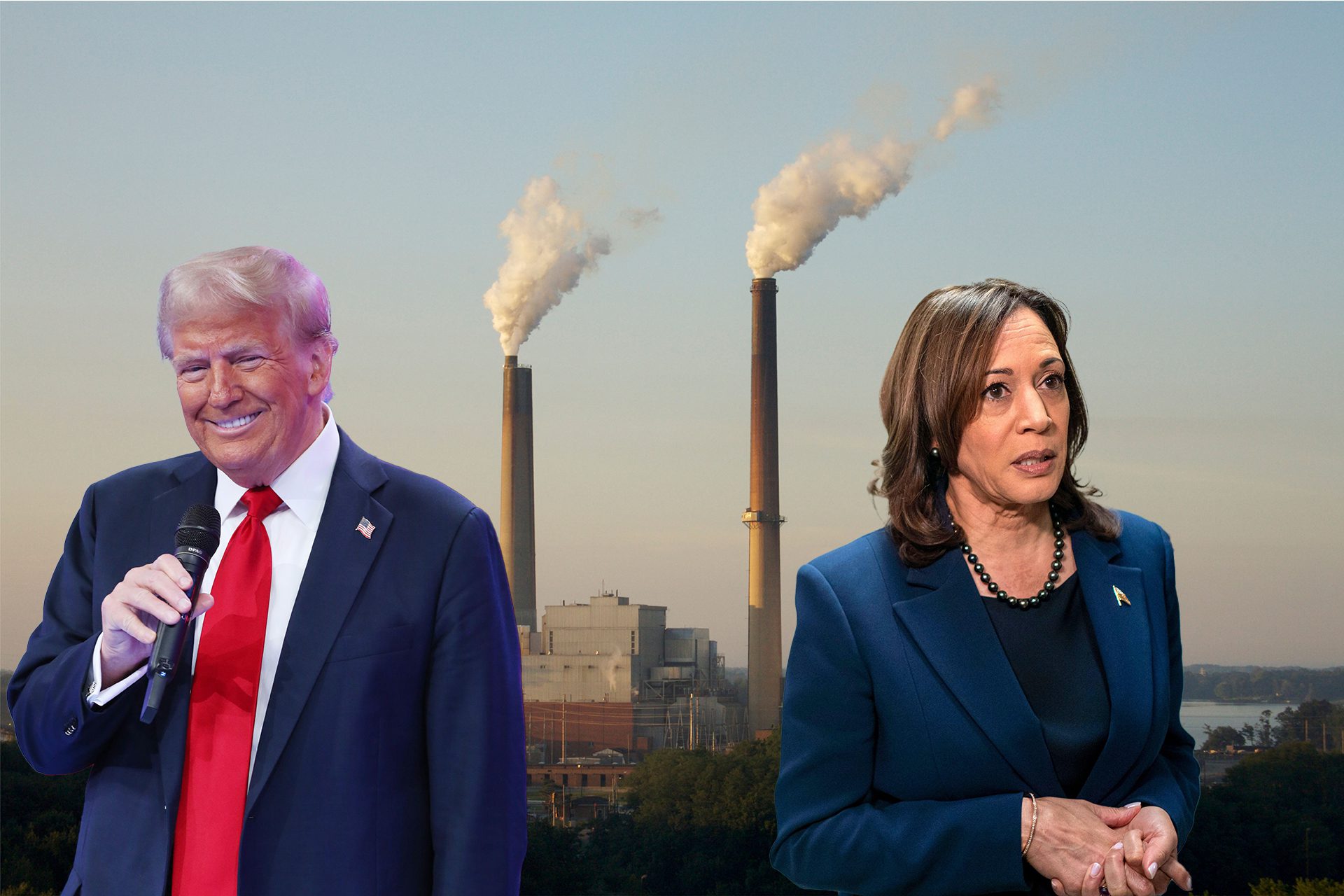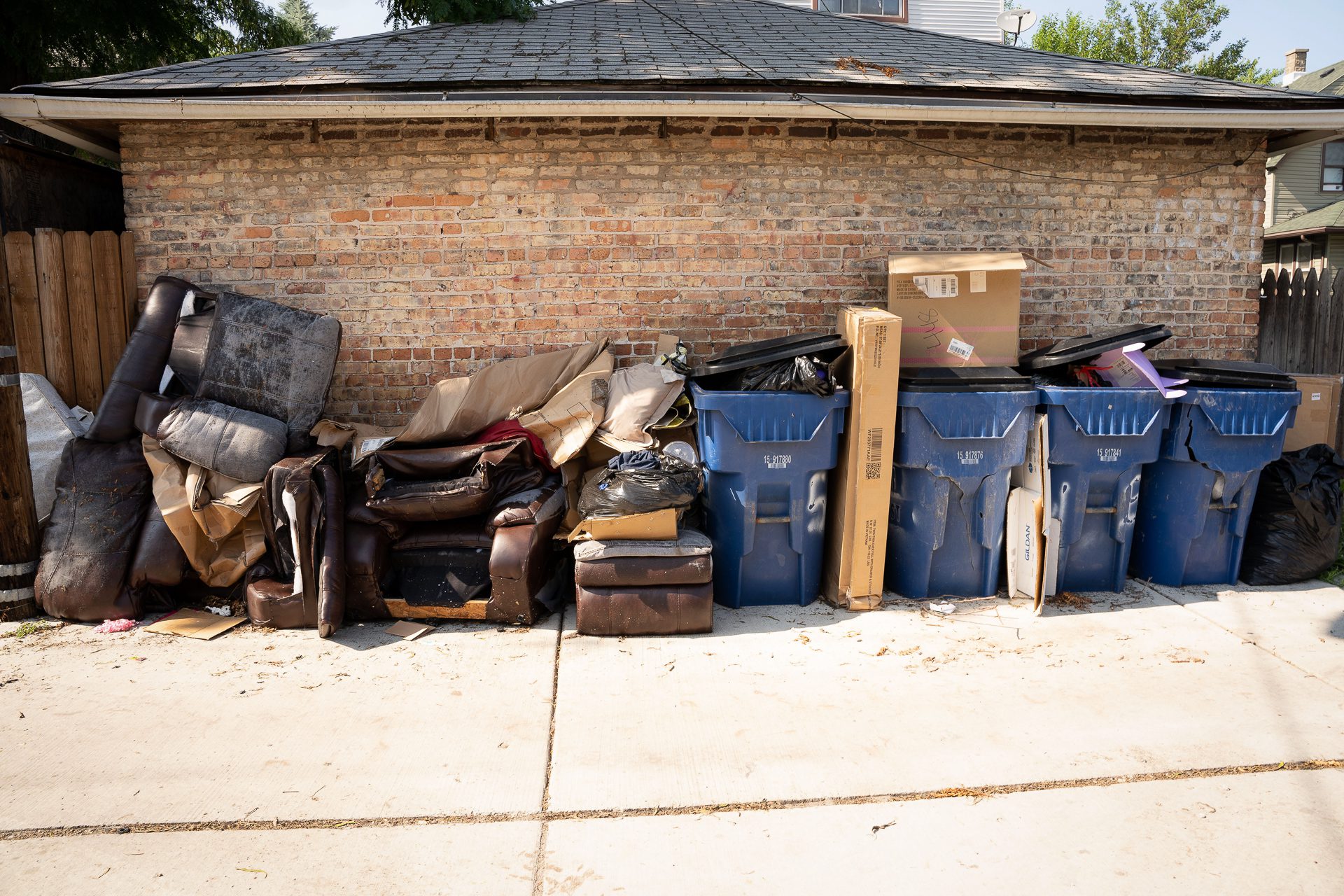 Photo illustration by Max Herman/Borderless Magazine. Source photos by: Guille Briceno/imageSPACE/MediaPunch/Alamy, Bonnie Cash/Pool via CNP/MediaPunch/Alamy, and Todd Bannor/Alamy Stock Photo
Photo illustration by Max Herman/Borderless Magazine. Source photos by: Guille Briceno/imageSPACE/MediaPunch/Alamy, Bonnie Cash/Pool via CNP/MediaPunch/Alamy, and Todd Bannor/Alamy Stock Photo Donald Trump and Kamala Harris differ on many policy points, but environmental justice and climate change are among the most stark.
With only a week left before the presidential election, questions remain on what a Harris versus Trump administration could mean for Chicago’s efforts to address climate change and environmental justice.
While Vice President Kamala Harris and former President Donald Trump have expressed differing views on climate change, energy and environmental justice, neither candidate has put out a detailed agenda on how they will carry out their environmental plans. However, Harris’ record as a prosecutor, senator and vice president, and Trump’s first term as president, offer a glimpse into what their environment-related actions could look like if elected — and what cities across the country can expect.
Illinois faces the threat of more frequent flooding and extreme heat days exacerbated by climate change. Chicago also has some of the worst air pollution in the country, concentrated in Black and Brown neighborhoods on the South and West sides due to heavy-duty truck traffic from nearby warehouses and manufacturing facilities.
News that puts power under the spotlight and communities at the center.
Sign up for our free newsletter and get updates twice a week.
The election outcome could shape how Chicago moves forward in cleaning its air, making communities of color healthier and adapting to a changing climate.
Whoever gets elected as president of the United States will inherit hundreds of billions of dollars in programs from the 2022 Inflation Reduction Act [IRA] and the 2021 Bipartisan Infrastructure Law currently being rolled out. Hundreds of millions of dollars are already flowing into Illinois to address environmental concerns and help the state transition to 100% clean energy by 2050 — a goal Illinois established through the passage of the Climate and Equitable Jobs Act in 2021.
Here’s how a Harris vs Trump win could impact responses to extreme weather, disinvested communities and cumulative impact efforts in Chicago and Illinois.
Disinvested Communities
One of the major federal programs the next administration will inherit is the Justice40 initiative. The 2021 executive order, issued by President Joe Biden, requires 40% of all “benefits” from climate, clean energy, sustainable infrastructure, environmental, and other investments be directed to disadvantaged communities.
The Biden administration launched the Office of Environmental Justice and External Civil Rights, which oversees the delivery of $3 billion in grants from the Inflation Reduction Act to communities disproportionately affected by pollution and other environmental issues.
Academic institutions and environmental organizations like Blacks in Green, a South Side environmental and social justice organization, were selected to serve as technical centers to help in their region disproportionately burdened by climate change and ecological pollution access federal funding to address these issues. Black in Green was awarded $10 million from the $177 million made available from IRA to create 17 technical assistance centers nationwide.
Harris has vowed to build on Biden’s environmental justice work, including IRA investments.
Along the campaign trail, Trump said he would “rescind all unspent funds” from IRA. However, he didn’t specify which IRA programs he would target.
Meanwhile, Trump’s conservative allies authored Project 2025, which is a wish list of actions proposed by the Heritage Foundation for the next Republican president. The document calls for eliminating the Environmental Justice and Civil Rights Office, reviewing the EPA’s grants program and “using enforcement to ensure compliance, not to achieve extrastatutory objectives.” Trump has tried to distance himself from the controversial right-wing policy proposal.
Extreme Weather Response
Many local and state governments, including Chicago and Illinois, are seeking support from the federal government to respond to more frequent severe weather events.
Illinois was hit with a record number of tornadoes last year and above-average temperatures this summer. It is also experiencing an increase in rainfall and floods. Communities of color, low-income groups and immigrants are most vulnerable to these extreme weather events, in part due to their close proximity to hazard-prone areas and lack of infrastructure or disaster management resources.

The state has received more than $390 million in direct assistance to families to recover from natural disasters since 2025, according to data collected by the Carnegie Endowment for International Peace.
The Biden-Harris administration designated $6.8 billion from the 2021 Bipartisan Infrastructure Law for disaster mitigation, prioritizing underserved communities, which Harris will likely continue. During the September presidential debate, Harris highlighted the economic burden homeowners face following extreme weather events due to soaring insurance costs or the loss of coverage altogether.
In 2017, Trump rolled back flood-protection standard rules in his first term.
Along the campaign trail, Trump has criticized Biden and Harris’ climate legislation and investments, calling climate change a “hoax. ” His running mate, Sen. JD Vance called it “weird science” in the vice presidential debate earlier this month.
Read More of Our Coverage
Project 2025 outlines plans to reform FEMA emergency spending by shifting most costs from federal to state and local governments. It also calls for various measures to break up and downsize the National Oceanic and Atmospheric Administration, which conducts climate monitoring and weather forecasting. Project 2025 authors say that its offices “form a colossal operation that has become one of the main drivers of the climate change alarm industry and, as such, is harmful to future U.S. prosperity.” The plan would also privatize the National Weather Service within NOAA, which produces free weather forecasts and warnings for the public.
Cumulative Impacts
Illinois is a freight hub with more than 2,400 warehouses across the state. Environmental justice advocates in Illinois are urging state officials to enact stricter vehicle emission standards for trucks and buses to address air pollution from truck traffic coming to and from these facilities that disproportionately impact communities of color.

During her 2020 presidential campaign, Harris said she would establish a mandate requiring all vehicle manufacturers to go electric, but she hasn’t committed to such a policy during her current campaign. As Vice President, Harris promoted investments in domestic electric vehicle manufacturing throughout the implementation of Biden’s climate and infrastructure legislation. She has not yet pledged to enact new policies to promote vehicle electrification and reduce vehicle emissions, if elected.
Trump has criticized Biden’s vehicle emissions rules. During his term, he rolled back Obama-era auto emissions standards and revoked California’s ability to enforce its own vehicle emissions standards in 2019. President Biden later restored the state’s authority. Trump has also criticized the push for electric vehicles, arguing that they risk killing jobs in the auto industry.
Illinois Environmental groups have also called for stricter pollution enforcement and policies requiring regulators to consider communities’ existing environmental burdens when making permitting decisions.
Neither Harris nor Trump has committed to such legislation or a new plan for addressing air pollution concerns.
In his first term, Trump rolled back dozens of EPA air pollution rules that Biden later reversed.
Meanwhile, Harris’ campaign website says she will build on IRA and the Bipartisan Infrastructure Law and continue to “hold polluters accountable to secure clean air and water for all.”
As District Attorney of San Francisco, Harris established one of the first environmental justice offices in the country in 2005, which was tasked with addressing environmental crimes. As a senator, Harris co-sponsored bills centered on environmental justice, including a cumulative impacts bill in 2019 that would have required federal and state regulators to consider cumulative impacts and persistent violations under the Clean Air Act and Clean Water Act in permitting decisions.
Aydali Campa is a Report for America corps member and covers environmental justice and immigrant communities for Borderless Magazine. Send her an email at [email protected]


